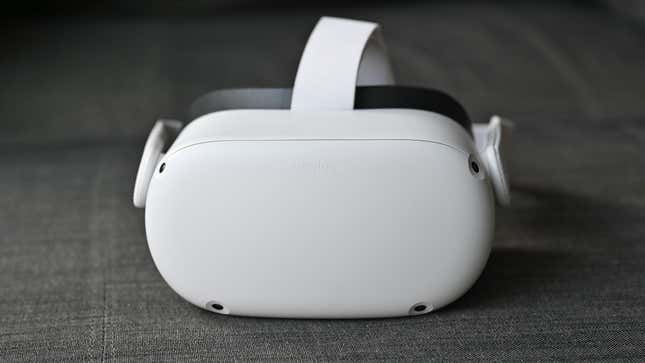
When Facebook purchased Oculus back in 2014—two years before the Oculus Rift was released—it wasn’t entirely clear what plans the social media giant had for the fledging virtual reality company.
Some thought it was a sensible move for Oculus, because Facebook’s deep pockets could be critical for funding the development of VR tech and would almost certainly boost its reach, while others were fearful of what Facebook CEO Mark Zuckerberg and co. would do as Facebook hooked its tentacles into Oculus. Headsets like the new Oculus Quest 2 feel like a big step forward for VR, but sadly, it seems like some of the biggest fears over Facebook pushing into VR and gaming are starting to come true.
Setting aside the early boom of third-party games like Farmville, which were built on top of the Facebook platform, Facebook’s acquisition of Oculus positioned the company at the forefront of a brand new category. Six years later, Facebook’s main VR rivals include just a handful of companies, such as HTC and Valve. However, as Facebook has integrated itself deeper and deeper into Oculus’ operations, two recent changes to its policies have highlighted the ways in which the social networking giant will change Oculus. And it turns out that skeptics were right.
The first change took place in August, when Facebook mandated that any first-time Oculus users will need to sign into their devices using a Facebook account. Beginning in 2023, all Oculus devices will require a Facebook account to log in, meaning that any existing users who choose not to merge their Oculus account and their Facebook account will be effectively locked out of their own headsets.
Facebook claims this change should make it easier for people to log into Oculus, discover new games, or connect with the friends, and for many, that may very well be true. But at the same time, the change is also breaking down the walls between Facebook and Oculus (and potentially breaking certain apps and games in the process). Either way, the message is clear: Facebook is Oculus and Oculus is Facebook, whether you like it or not.
For folks who dove into virtual reality and snagged Oculus devices because they felt like these headsets were the future of gaming, this change feels like a betrayal, with many pointing back to old posts from Oculus founder Palmer Luckey saying that people wouldn’t need to log into their Facebook accounts to use the Oculus Rift. (Though, technically, I must point out that Luckey only referenced the original Oculus Rift, which has already been put out to pasture, and not all future Oculus devices.) And with Facebook having previously introduced a number of social features and data collection techniques that were tied to the use of a Facebook account, many feel like Facebook’s social media-driven policies are invading Oculus VR.
Then, just last week, Upload VR discovered that if someone deletes their Facebook account, their Oculus app purchases and achievements will also be deleted. So if you nuke your Facebook account, say bye bye to all your Oculus games, too. Ouch.
Previously, Oculus users were satisfied with (or at least tolerant of) Facebook as long as the two entities operated largely independently. But this new revelation makes the push to merge Oculus accounts with Facebooks accounts seem much more insidious, and after years of blissful ignorance, many gamers’ fears about Facebook encroaching on their entertainment space is finally coming to pass.
Facebook is looking to expand its gaming content with new cloud-based gaming functionality built into the Facebook Gaming tab, so this definitely isn’t the last time gamers will have to reckon with Facebook’s policies before deciding if they want to wade in. And while Facebook says it currently only gathers Oculus data, like what kind of games you buy, and not biometric data gathered by an Oculus headset’s sensors (like your height, room size, or anything seen by external tracking cameras), that may not always be the case.
So, where does that leave us? Well, that kind of depends on how you feel about Facebook. For anyone concerned about digital privacy, Facebook’s increased push for data collection across its various platforms may push away gamers who might otherwise be interested in new games or Oculus VR devices. One thing is certain: Pretending that Facebook and Oculus aren’t one and the same simply isn’t a possibility.